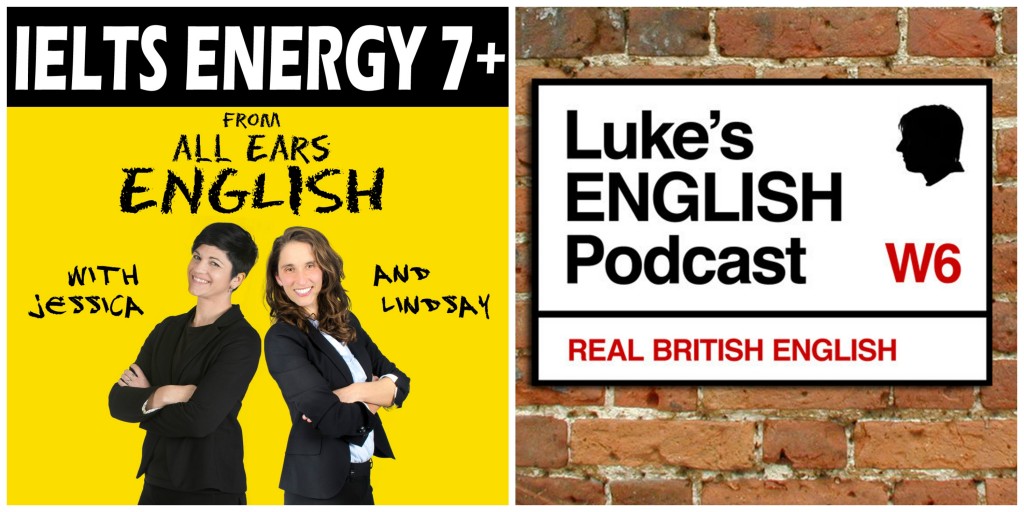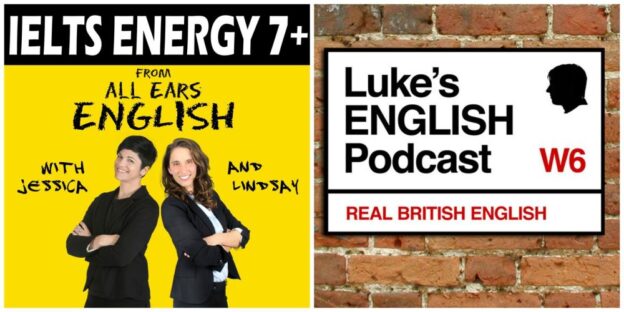On the podcast today I’m talking to Jessica Beck who has been working in English language teaching for over 10 years. She is an instructor, a teacher trainer and an author of 14 textbooks for learning English. You may also know Jessica from her work on the IELTS Energy Podcast (www.ielts.allearsenglish.com), which is part of the All Ears English. I talked to Gabby and Lindsay from AEE on LEP last year about culture shock, remember that? Well, Jessica is part of the All Ears English team, and is known there as the “Examiner of Excellence”. So, she knows a lot about the IELTS test, and he’s got some good advice for any of my listeners who plan to take the test, including how you can improve your speaking score if you have a good sense of humour. If you’re not planning to take the test, these skills can also be applied to your use of English in general life too.
 [DOWNLOAD]
[DOWNLOAD]
Jessica has kindly written a blog post which includes the tips and useful language she mentions in this episode. You can read that blog post below.
I expect that most of you know what the IELTS test is, In fact, I have done an episode about IELTS before on LEP in which I went through every part of the test in one episode, dispensing various bits of Jedi wisdom to help you get a better score. That episode is called “Tips and Tricks for the IELTS Test”, and is episode number 254 of Luke’s English Podcast.
Check it out here www.teacherluke.co.uk/2015/01/22/254-ielts-tips-tricks/
For those that don’t know, IELTS stands for International English Language Testing System, and it’s now the world’s #1 test of English language level. The test measures your English in 4 areas: reading, writing, listening and speaking. The maximum score in each area is 9 (expert user) and the lowest is 1 (total beginner). Lots of universities, employers and other institutions around the world require an IELTS score as requirement for entry, and 7 is usually the target score, sometimes it’s higher, sometimes lower depending on the institution. Cambridge University in the UK for example requires a minimum of 7.5 overall, with no less than 7 in any of the categories. So, if you want that place at a great British or American university, the first challenge is often to get a really good IELTS score, and what you need is good advice and strategies to help you do your best.
So, in this episode we’re going to meet Jessica, and talk specifically about the IELTS speaking test, in which you have a 15 minute interview with an IELTS examiner and your spoken English is tested in a few ways. Jessica has loads of tips for the speaking exam, and I’m hoping that she can give us some advice on how having a sense of humour can get you a better score in the test. So listen for some more top tips for IELTS in this one.
Also, what do you think would happen if I took the IELTS speaking test? Well, listen to the whole episode and you’ll find out…
Now, let’s meet Jessica the “Examiner of Excellence”.
Read Jessica’s Blog Post:
Humor Increases IELTS Speaking Scores
Say what??!!
I’m serious. It does.
By Jessica Beck from All Ears English IELTS
Many students, and teachers, for that matter, view all exams as formal and academic. Because of this, they believe that on these exams, test-takers must behave, speak, and write in an academic, formal style all the time.
While this may be true for some tests, there are many reasons why an IELTS candidate should not behave this way on the Speaking exam.
As we discussed on the podcast, a common mistake students make is not learning about what the IELTS examiner is looking for.
Students often look at example questions, memorize high-level words and phrases, and believe this is enough.
It’s not!
You must know what you are graded on, and where to use these words and phrases.
Your score, which can be from 0 to 9, is broken down into 4 aspects- Fluency and Coherence, Vocabulary, Grammar and Pronunciation.
You can read definitions of the band scores in each aspect at https://www.ielts.org/pdf/SpeakingBanddescriptors.pdf.
What you must notice about the band score descriptors is that the examiner wants to hear a range from you- a range in vocabulary, in your ability to communicate about a variety of topics, and in your pronunciation.
The fact is that in Parts 1 and 2 on the IELTS Speaking exam, almost all of the questions are about you. They are personal and informal. Therefore, if you answer these questions in a formal way, you are showing that you do not have a range of communication ability and that you are unable to talk about personal, informal topics.
So, where does humor come in? How does it help you raise your score? Read on!
- Humor helps you improve your pronunciation score. It helps you relax, allowing you to show your personality and use emotion in your voice. Showing relaxed and expressive pronunciation can push this score up to a 7 or higher!
- It improves your fluency and coherence score. If you are able to answer some informal questions with a few informal anecdotes, or very short stories, about yourself, this will show that you can communicate appropriately and effectively in informal speaking situations.
- It improves your vocabulary score, because you show you can use appropriate vocabulary to the question, and you have some knowledge of more interesting words and phrases. Showing the examiner a range of informal vocabulary in Parts 1 and 2, and formal vocabulary in Part 3, pushes your score up to a 7 or higher.
- NOTE: Even though I’m encouraging you to communicate in a relaxed way, this doesn’t mean that you slump your shoulders and provide one word answers. You must always sit and behave respectfully, and ALWAYS answer in complete sentences.
We gave some examples of how to answer in a humorous manner on the podcast, and the phrase “self-deprecating” came up a few times.
Self-deprecation is the ability to make fun of yourself, or to share information about yourself that shows you make mistakes.
This is a humble way of communicating, and it can endear you to your listeners.
This is true on the exam and in real life!
For example, if the examiner asks, “Do you enjoy taking photographs?” A self-deprecating answer would be, “I’ll admit, I actually love taking selfies. I know this is a silly habit, and that is honestly a bit embarrassing, but I take selfies absolutely everywhere- at home, on the bus, walking up the stairs, waiting for my dry cleaning. However, I post almost none of them, so I guess it’s not that horrible of a habit!”
Other phrases you can use to introduce answers like this are: You won’t believe this, but…, This is crazy, but… and I’m a bit embarrassed to say this, but….
An excellent way to prepare to communicate in this way, on the exam and in real life, is to watch stand-up comedy, or see/listen to interviews with stand-up comedians.
Some podcasts that I recommend are Wait Wait Don’t Tell Me, a news quiz with three stand-ups, How Did This Get Made, a show with 3-4 stand-ups who talk about really bad (but sometimes popular!) movies, and Comedy Bang Bang, an interview show with hilarious skits.
If you challenge yourself to experience this type of Western, English humor, not only will this help you communicate impressively with the IELTS examiner, but it will also help you talk naturally with native speakers, and understand more jokes in movies and TV shows.
Have fun and get your target score!
Click here to get the 7 Easy Steps to a 7 or Higher on IELTS
Jessica Beck is the IELTS professional at All Ears English IELTS. She has helped hundreds of students reach their target score through her simple, step-by-step systems and strategies. Learn more with Jessica on the IELTS Energy Podcast in iTunes.





